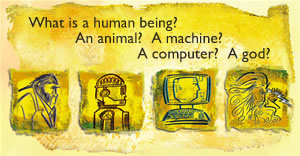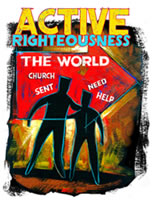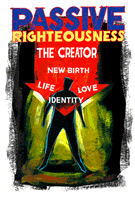by Charles Arand

These questions have received more attention in the last 100 years than during any previous time. The answers determine our identity, our place in this world, and the purpose of our lives. New fields of study like psychology, sociology, genetics, cultural anthropology, socio-biology, and behavioral finance have attempted to answer such questions.
Theology gives a different answer: To be human is to be righteous-to be conformed to God’s will for human life.
Two kinds of righteousness
Martin Luther believed that if we want to grasp the full scope of our humanity, we must affirm two distinct yet simultaneous dimensions of human life. Our life with God is of a fundamentally different nature than is our life with one another. 
Our relationship to God defines who we are. We are the recipients of His gifts and love. Here our righteousness is passive not active.
Our life with each other gives shape and direction to our lives. The needs of our neighbors call us to action. Here our righteousness is active not passive.
As creatures, we receive our life and identity from the Creator. When God created Adam, Adam was not given a probationary period to prove that he was worthy of his humanity. God created him without any active participation or merit on his part. God formed Adam from dirt. God gave him the breath of life. God made him in His image. God addressed Adam as a conversation partner.
God’s creative initiative and commitment gives us, Adam’s children, dignity as human creatures. For Luther there was no greater honor or higher title than to be called a creature of God. For in recognizing our finitude, we find identity and meaning as we rest in God’s hands. Our righteousness is passive before God.
As sinners, we receive new identities as children of God. While we lay cold dead in our sin, God sent His Son into the depths of our brokenness to bring us new life. Jesus lived as the perfect human being that God intended us to be. Taking our sins as His own, He died and rose for us when we did not deserve it. God again commits Himself to us in His promises. Through these promises He elicits a faith that entrusts our lives to Him.
Through the waters of Baptism, the Spirit gives us a new birth into a new age, again without any active cooperation or participation on our part. Thus, in the presence of God, our righteousness is passive—a gift received.
At the same time, God employed Adam and now us, Adam’s children, as His co-workers in relation to the world around us. God gave Adam the task of naming the animals. Recognizing th at it was not good to be alone, God brought Eve to Adam. Made for each other, they were drawn to each other in a union of giving and receiving in mutual love. God gave them the task of cultivating the garden and creating culture.
at it was not good to be alone, God brought Eve to Adam. Made for each other, they were drawn to each other in a union of giving and receiving in mutual love. God gave them the task of cultivating the garden and creating culture.
He does not want us to become idle with regard to our responsibilities in family life, public life, work life, and church life. Through our active cooperation, God enters human affairs to maintain and govern the world. Here in the world, our righteousness is not passive, but active.
God enlisted our participation again, this time through Christ. In the promise of the Gospel, God bound us together as brothers and sisters of Christ, co-heirs of the new creation. In doing so, He does not call us to live as exiles in the world. Instead, He sends us back into creation. Receiving life from God unleashes our love for one another within creation. Our various walks of life provide us with our mission assignments to bring the Gospel into the lives of others. In a sense, the spiritual needs of our neighbors, as sinners, function as God’s call for us to help. The new creation now bursts forth in the midst of the old creation.
The Reformation insight recognized that we need both kinds of righteousness to be fully and genuinely human. We cannot live before God in isolation from one another or from the world. Nor can we truly live for each other in isolation from God and His gifts. We need both relationships to function as God intended.
We daily receive life from God by eating the food, drinking the water, and breathing the air that He gives us. We daily receive new life by returning to our baptism in repentance, hearing the Word, eating and drinking the body and blood of our Lord.
At the same time, we care for others by going to work, providing shelter and food for our families, caring for the needy, and looking after the environment. (Read “Is God ‘Green’?” Page 10.) We care for the spiritual welfare of our neighbors through prayer, catechesis, and bringing the Gospel to bear upon their lives.
Keeping them distinct
We must remember that these are two different kinds of righteousness. We dare not confuse them. To confuse them destroys our relationship with God, with other human beings, and with the non-human creation. It distorts and destroys our humanity.
We lose our identity when we take our accomplishments in the world and make them the basis for our relationship with God. It happens when we decide to take charge of our relationship with God and seek God’s approval on our terms. This legalistic approach to God reverses the relationship between God and His human creatures. It also affects our horizontal relationships. For we must now use our neighbor in order to put God into our debt. That is to say, we help our neighbor only because it really helps us to win God’s favor or to make us feel good about ourselves.
It is this to which Luther said “no.” We are children of God by faith apart from our works. The law makes it clear that if we seek a performance review from God, we will never measure up.
To the question, “How am I doing?” the Law gives only one answer: “You have not done enough. Try harder.”
For this reason, Christians listen only to the voice of the Gospel and turn a deaf ear to the Law’s accusations. Because legalism is a perennial human problem, the Christian life must remain a life of ongoing repentance, a daily return to our baptism where the old creature is executed and the new creature arises to a new life.
A less common but equally dangerous way of confusing the two kinds of righteousness is to contend that redemption is our only concern. “I’m saved, that’s the only thing that matters.”
This can result from a misunderstanding of the line, “Heaven is my home; I am but a stranger here.” Since heaven is our home, this current world is no concern to us. This approach results in various forms of antinomianism-the belief that the Law no longer applies to Christians. It ignores the fundamental nature of salvation as a renewal of creation and not as a destruction of it.
As Christ descended and became incarnate, so we are sent into the world for the purpose of maintaining it while we await the revelation of the new creation. With our relationship to God eternally secure, faith unleashes our activity into the world around us. No longer needing to take care of ourselves, we can go above and beyond the call of duty in serving our neighbor. Faith does not simply avoid “hurting or harming our neighbor,” but it seeks to “help and support him in every physical need.” We can roll up our sleeves and get to work in a world that belongs to Christ.
So how do we seek both kinds of righteousness without confusing them? Respect the distinctive nature and purpose of the two relationships in which God has placed us. Seek the righteousness of faith in Christ for the sake of our life with God. Live for others not because it saves you or gives you an ironclad assurance of salvation, but because it is good for God’s world.
As human beings we live a cruciform existence. Bob Kolb, a fellow professor at Concordia Seminary, describes the Christian life in its two dimensions this way: Human life is cruciform—eyes lifted to focus on God, feet firmly planted on His earth, arms stretched out in mutual support of those God has placed around us. Having the focus of our lives directed toward Christ inevitably extends our arms to our neighbors. As Luther put it, this is “our theology.”





